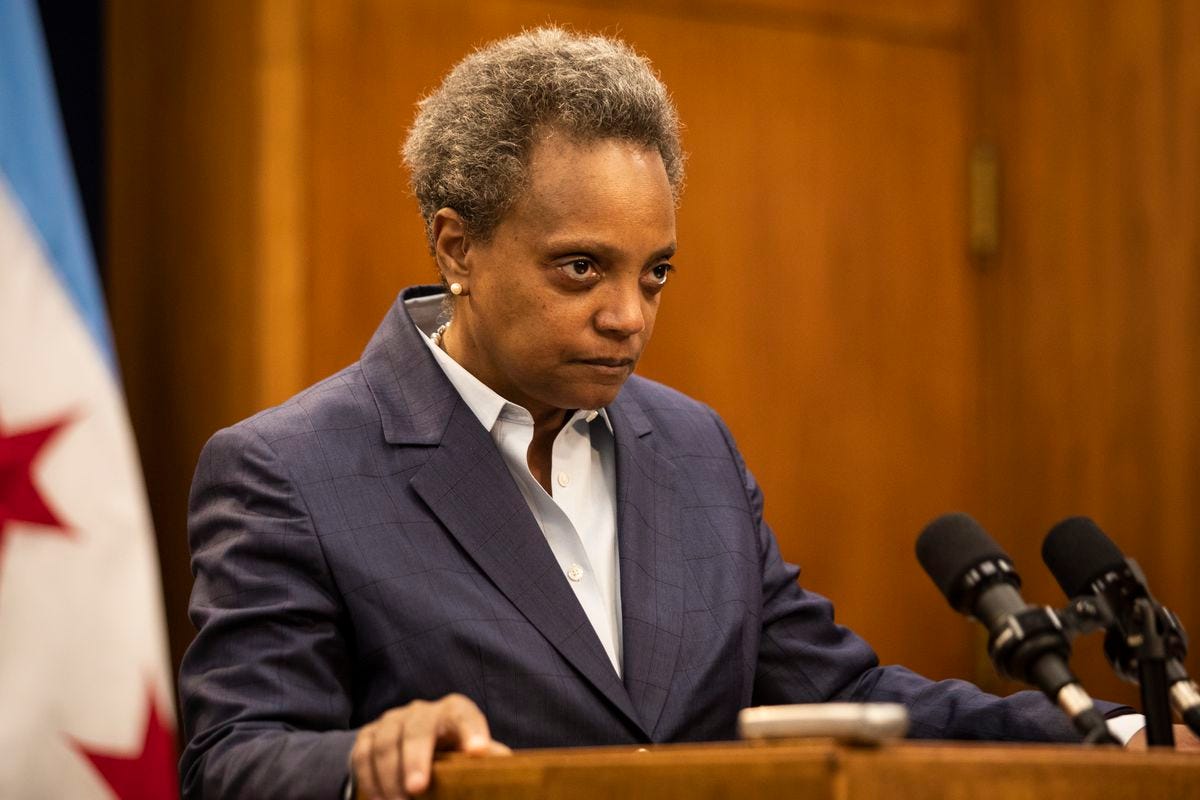THE ILLINOIZE: Thursday Free for All
September 23, 2021
Good morning.
There was a Chicago Tribune story yesterday about how animal shelters are bursting at the seams. Obviously, there are plenty of people who got a dog while working from home and things got complicated now that they're heading back to the office.
Add the upcoming end of the eviction moratorium and things could get bad out there.
Most people who know me know I like my dog more than I like most people. (And I remain convinced cats are fluffy serial killers.)
So, if you're in a position to adopt, I'd encourage you to do so. If you're not, I hope you'll make a contribution to your local non-profit shelter.
If you’re enjoying receiving our free content, we’d encourage you to subscribe to our paid content which includes breaking news alerts and two subscriber-only newsletters each week.
Let’s get to the Free for All.
YOUR THURSDAY FREE FOR ALL
(note: we’re not responsible for paywalls and restrictions from other news outlets)
IDPH files emergency rules to help implement Pritzker’s school exclusion order (WGEM)
The Illinois Department of Public Health has filed emergency rules to make Gov. J.B. Pritzker's recent executive order regarding schools less vulnerable to legal challenges.
Most of the language in the IDPH rules is identical to the executive order Pritzker filed late Friday. However, the department deleted any references to "modified quarantine" in previous guidance. That previously allowed students to continue in-person learning after coming in contact with someone who had COVID-19.
Attorney Tom DeVore won several cases stating schools couldn't put any student under quarantine without a court order.
Attorney Brian Bare says by deleting "modified quarantine", IDPH is sending a message to the courts that they did not agree with DeVore's interpretation of their previous regulations.
The new rules clarify that school districts don't need court action to require testing, masks, or excluding students and school personnel.
"By making it clear that these types of things can happen without a court order or without an order from the county health department, that makes it much easier for schools to continue to operate in accordance with the executive orders and the guidance form the State Board of Education," Bare said.
Related: CPS has tallied nearly 500 COVID-19 cases, still has no safety agreement with teachers union (Chicago Tribune)
With half of kids quarantined at W. Side school, union pushes for more safety measures, district official backs vaccine mandate (Chicago Sun-Times)
Kane County COVID-19 cases outpacing contact tracing (Daily Herald)
Maskless man arrested in southwest Illinois after refusing to leave school board meeting (Belleville News-Democrat)
Time for the mayor to turn frank talk on pensions into action (Crain’s Chicago Business)
Chicago Mayor Lori Lightfoot has a refreshingly realistic take on the public employee pension crisis, and an unsparing assessment of political leaders who avoid confronting it. Too bad she's not equally clear-eyed and courageous about what it will take to defuse the fiscal threat she describes so accurately.
In a Sept. 20 meeting with Crain's editorial board, Lightfoot emphasized, as she has before, that rapidly escalating pension costs are an unsustainable burden for the city, other municipalities across Illinois and the state itself. Government pension plans have far less money than they need to meet future obligations to retirees. Funding levels for Chicago's four pension funds range from 19% of future liabilities to 44%, far below the 90% level actuaries consider well-funded.
Required contributions to pension funds are rising steadily, consuming an ever-larger share of city resources. Chicago will contribute $2.3 billion to pensions in fiscal 2022, double the 2017 contribution. By 2026, the city will have to pump $2.5 billion into the plans. The story is similar for other municipalities and the state.
Unlike other elected officials, Lightfoot makes no effort to downplay the pension issue, calling it the "biggest problem" for city finances.
Lightfoot is just as direct on the urgent need for government and labor leaders to work together on a solution.
"We have to have a serious conversation about pensions," she said. "We need the governor to lead. We also need legislators to step up and lead. We also need organized labor at the table."
Related: Chicago's guaranteed-income program would be biggest in U.S. (Crain’s)
Speaker Welch taps first Latina to run House elections — ex-ComEd lobbyist and staffer (Chicago Sun-Times)
Illinois House Speaker Emanuel “Chris” Welch picked a new election czar Tuesday, tapping a former House Democratic staff member — and former ComEd lobbyist — to ensure the party keeps and builds its supermajority in the chamber.
Lizbeth Ramirez, 36, will oversee full and part time staff in the state’s lower legislative chamber, fundraising for the caucus’ campaign fund — Democrats for the Illinois House, as well as the coffers of individual House Democrats. She was chosen executive director of the House Democrats’ campaign fund by a committee of members of the House Democratic Caucus and staff.
Ramirez will also take on recruiting Democratic candidates to run for House seats.
In an interview with the Chicago Sun-Times on her first day on the job, Ramirez said Tuesday that she was nervous, but, “more than anything, excited to be here.”
The daughter of Mexican immigrants, Ramirez came to Illinois when she was eight. She was undocumented and didn’t know English, but her parents taught her the value of hard work, preparedness and finding “opportunities for those who are looking to improve their lives,” she said.
“That’s one thing that I’ve always strived to and pushed for in anything I do,” Ramirez said. “Working hard and bringing fairness and opportunities for communities and neighborhoods that I work in or work for — in this case, the state of Illinois.”
Ramirez became a U.S. citizen when she was 16. She worked on staff in the House from 2008 to 2015 before becoming a legislative liaison for ComEd, serving as one of the utility’s in-house lobbyists. That meant she worked with the House’s Democratic Caucus for about three years before moving to ComEd’s external affairs office.
Ramirez has not been connected to any of the wrongdoing in the ComEd/Madigan bribery case.
Southern Illinois town pins hopes on river port development (Capitol News Illinois)
Get off on Exit 1, just before the highway crosses the river into Missouri, and it’s just a short drive into town. A railroad overpass emblazoned with the name “Cairo” lets the driver know they’ve arrived. Just beyond, it becomes apparent why those highway signs are mostly blank.
The main street leading into town is dotted with one empty building after another – buildings that used to be gas stations, convenience stores, local eateries, even a grocery store. There is no place left in town to buy gasoline or groceries. A single barbeque restaurant – said by locals to be excellent – is the only place for dining.
This city at the confluence of two of the mightiest rivers in the United States, the Ohio and the Mississippi, is the county seat of Alexander County, which once boasted a population of more than 25,000. It is now down to just 5,240, according to the 2020 U.S Census. That was a drop of 36.4 percent just in the past 10 years, the biggest population decline of any county in the nation.
On the east side of town, just a few hundred feet from the Ohio River levee, Larry Klein sits in his office at the Cairo Public Utility Company, a nonprofit company that serves the community and, oddly, also operates the town’s only hardware store.
Klein, 63, has lived in Cairo all his life and has watched its decline firsthand. But he’s not despondent about it. In fact, he remains hopeful of a turnaround.
“That's what this brings,” Klein said during an interview. “One of my reverend friends, that's what he said. He said, ‘Larry, this – I'm looking for the right word – the impact or effect this will have.’ He said, ‘Larry, it brings us hope.’ And that's, that's the best word to use.”
Klein was referring to a development project that has been on the drawing board in Cairo for at least a decade, but which is getting a big boost from the state with $40 million from the Rebuild Illinois capital improvements program to develop an enormous river port along the Mississippi River at Cairo. Klein serves as chairman of the Alexander Cairo Port District, which is in charge of the project.
It’s estimated that about 80 percent of all the barge traffic in the United States passes by or through the confluence of the two great rivers. The river port at Cairo is envisioned as a facility where barges, as well as larger “river vessels,” would unload cargo containers that come upstream from New Orleans onto rail cars and semis for distribution throughout North America.
Saving Cairo will take a lot more than a port, but the potential jobs that come with it are a huge first step.
JOIN US











